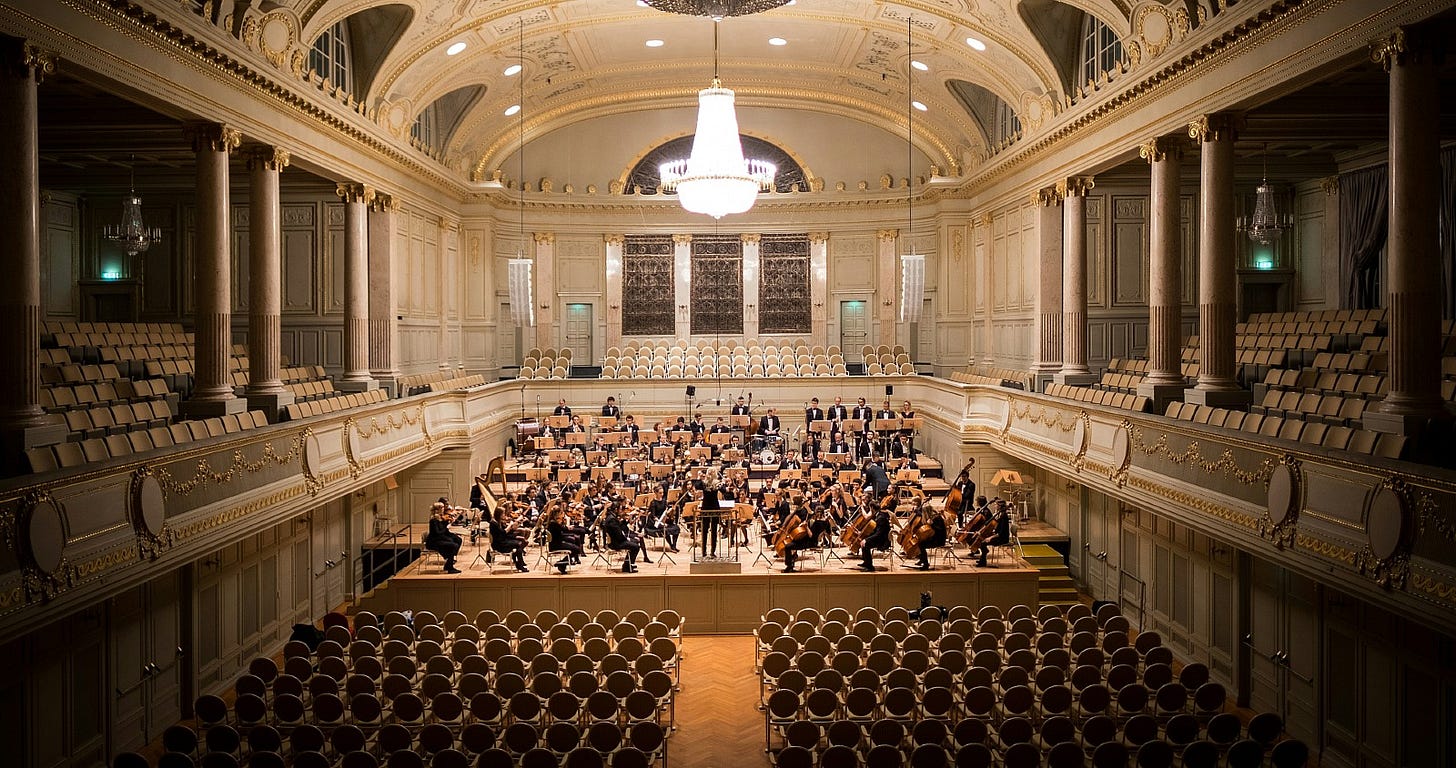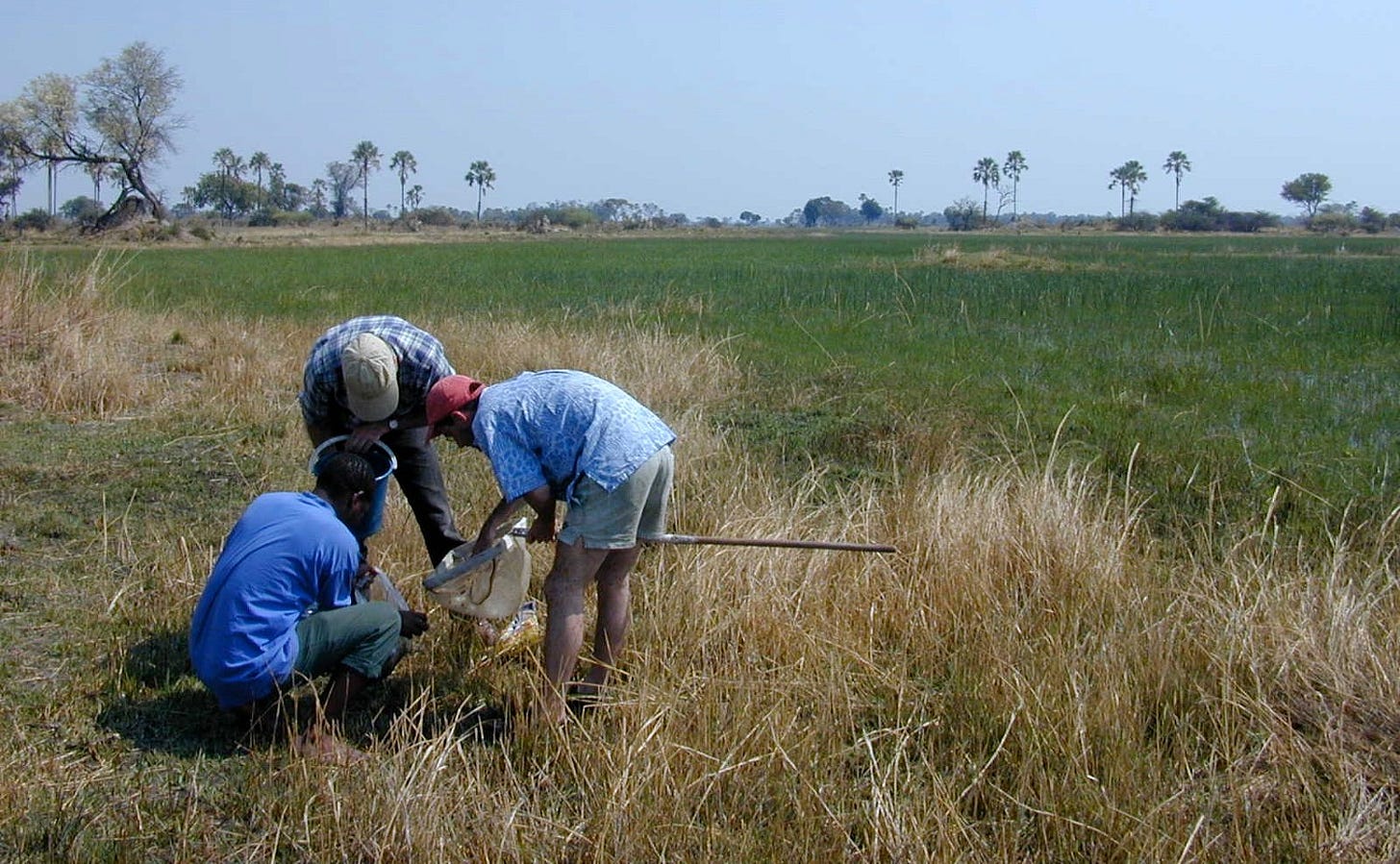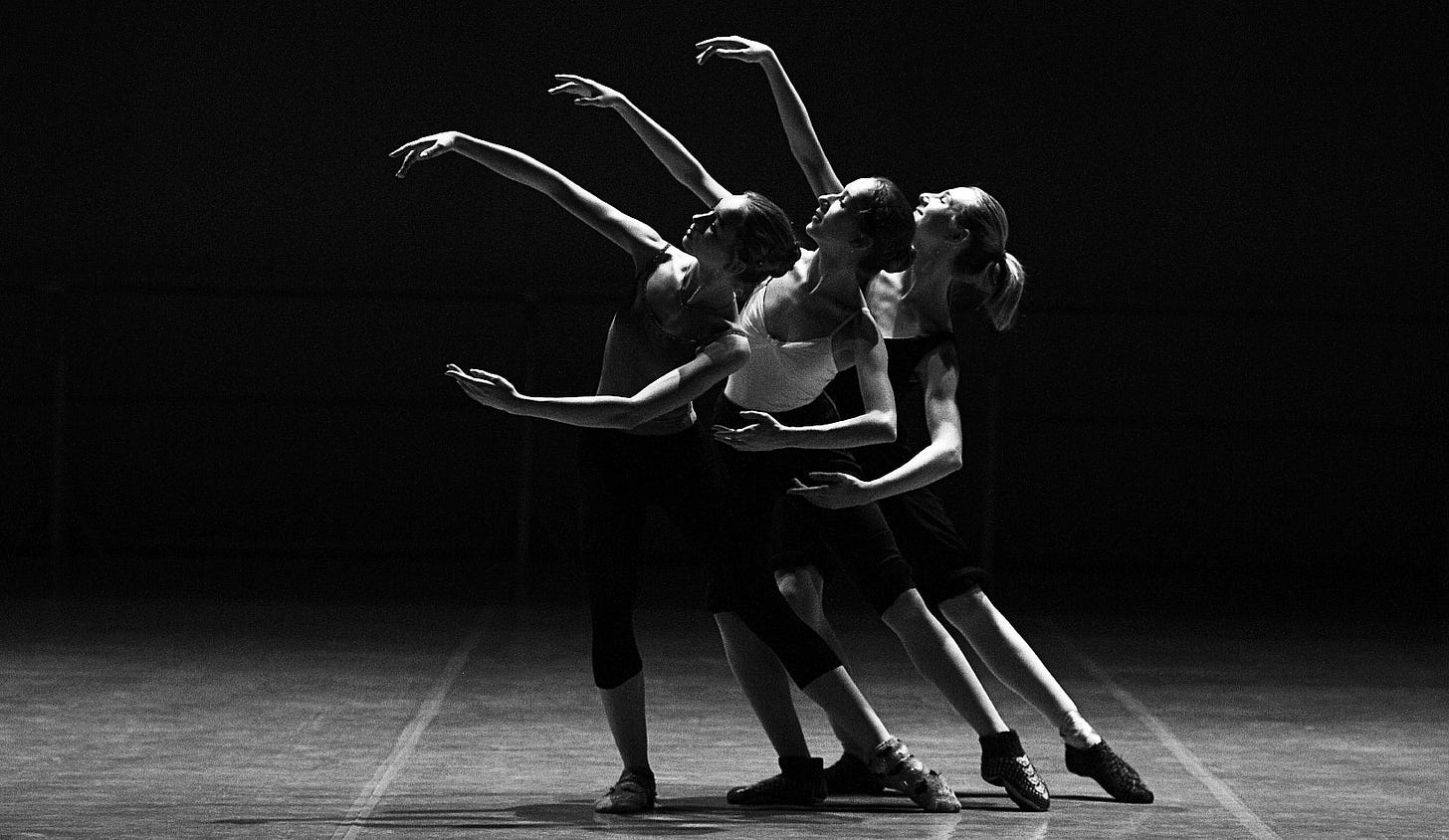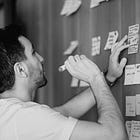Who should conduct the science orchestra?
When Scientists Play Together The World Benefits
The best orchestras in the world have conductors who bring musicians together. Who gets the baton for the science orchestra?
As an ecologist and lifelong sceptic, I've spent decades watching brilliant minds wrestle with environmental challenges. These experts often remind me of musicians practising in separate rooms, each perfecting their part, frequently demonstrating great talent and virtuosity but rarely coming together for the full symphony.
The soil scientist rarely talks to the economist, while the climate modeller and the conservation biologist pursue different goals. Yet the problems we face demand all these voices play in harmony.
In this issue, we'll explore a provocative question…
Who should conduct the science orchestra?
Surprising parallels between artistic and scientific collaboration might change how you think about environmental problem-solving. Understanding how different scientific disciplines can work together, or why they often don't, is crucial for making sense of today's sustainability challenges.
So grab your metaphorical opera glasses. We're about to take a front-row seat to one of the most important performances in human history… It’s the quest to harmonise scientific knowledge for planetary wellbeing.

A night at the ballet
What a pleasure to spend a night at the Sydney Opera House for my wife’s birthday, captivated by the Australian Ballet. What the human body can do is astounding, and what happens when music and dance are combined is breathtaking.
This synergy between dancer and musician takes decades of dedication for each participant to perfect their talent. But these consummate artists still need some coordination, a bringing together.
In rehearsals and on the night of the performance, this is the role of the conductor.
Back in the day, when I used to play in brass bands, I was taught to play on the beat when the conductor put their hand down, left or right, depending on the time signature. That was when you played, right?
I'm watching the Opera Australia Orchestra, and the music was coming some time after the beat from the dynamic conductor. Her style adapted to each of the three ballets performed. I realised that she wasn't conducting for the beat at all. The musicians were way too accomplished to need such elementary prompting.
She was after expression, nuance, and lashings of the secret sauce for making good music exceptional. There was no need to tell the bassoon player that he had to come in on the third beat of the bar. She was helping him to put a tad of extra emotion into a particular passage, encouraging rather than directing.
The conductor can trust that the musicians will do what they must. Her role was to convey subtle information and energy to translate the piece to the musicians in front of her, then to the dancers on the stage and blended for the audience, absorbed in the spectacle.
And that's the kind of conductor you want. A baton is waved as a gesture that gathers the little bits and pieces without overriding the talent of the musicians to support the dancers.
While we are on this ballet example, another feature was obvious. There was powerful mutual respect between the two sets of performers. They can't see each other, but they respect the quality, which makes all the difference to the overall experience.
When it all comes together, it is magical.
Who are the science musicians?
There are so many science disciplines, each with their specialisms, nuances and tropes, that it is hard to decide who should be in the orchestra.
Even if we simplify the choice for those involved in sustainability science, there are many options.
Sustainability science… studies how human and natural systems interact to understand how Earth's limited resources can support human well-being over generations. It combines methods from ecology, economics, and social sciences to examine complex challenges like climate change, resource depletion, and biodiversity loss.
It is a young discipline, and even though it might contain a misnomer, it is closer to mindful scepticism than most science. Rather than focus on isolated parts of problems, sustainability science looks at whole systems and their connections. It asks not just "What is happening?" but "What should we do about it?" and "How can we make better decisions?"
It is supposed to be the science of balance between what humanity needs and what Earth can provide, between short-term benefits and long-term consequences, and between economic growth and environmental health.
So, who should we choose if we made the orchestra from players in this niche discipline?
Here are the key types of scientists involved in sustainability science...
Environmental Scientists study ecosystems, biodiversity, pollution, climate change, and the impact of human activities on natural systems.
Ecologists focus on the relationships between organisms and their environments, which are critical for understanding ecosystem services and biodiversity conservation.
Climate Scientists study climate patterns, climate change, and its effects on global systems, often to mitigate climate impacts.
Social Scientists (e.g., Sociologists, Anthropologists, and Economists) investigate human behaviour, social systems, and economic structures that influence sustainability, addressing issues like resource use, policy-making, and social equity.
Geographers study human-environment interactions, spatial analysis of resources, land use, and urban sustainability.
Engineers (e.g., Civil, Environmental, Renewable Energy Engineers) develop sustainable technologies, energy systems, water treatment processes, and green infrastructure.
Urban Planners focus on sustainable city design, transportation systems, and efficient land use.
Agricultural Scientists work on sustainable farming techniques, food systems, and land management practices to promote food security without degrading ecosystems.
Conservation Biologists focus on protecting species, habitats, and ecosystems, aiming for long-term ecological health and resilience.
Sustainability Economists analyse economic systems to promote growth models that factor in environmental costs, resource scarcity, and equitable development.
Hydrologists study water resources, watershed management, and the sustainable use of water for various ecosystems and human needs.
Forestry Scientists specialise in sustainable forest management and the preservation of forest ecosystems, which are key components of climate regulation and biodiversity.
Public Health Scientists focus on the relationship between environmental sustainability and human health, particularly concerning pollution, climate change, and resource scarcity.
Energy Scientists explore sustainable energy sources, like solar, wind, and biomass, and their integration into global energy systems to reduce dependence on fossil fuels.
Data Scientists and systems modellers use computational tools to model complex systems, analyse data, and simulate future scenarios for sustainable development.
A few ringers might be upset about not being included in this list.
I can’t believe we have forgotten the Soil Scientists, but they tend to shun the limelight because if everyone knew how important their discipline is, they would have to turn their phones to silent.
And since when was economics a science? Karl Popper will be turning in his grave. But we must be inclusive. It is hard to leave any out.
So we need to keep them all in and find a great conductor. A virtuoso who could bring them all together to deliver magnificent sound.
Who might that be?

Conductor of the science orchestra
Who would have the respect, skill, awareness and collective interest in the outcome to conduct the sustainability science orchestra?
There are plenty of candidates…
Ex-politicians now peddling their trade with international agencies and organisations would be the first to put their hands up. Few of them would miss an opportunity for personal advancement.
Secretaries General at the relevant UN agencies would undoubtedly put their hands up, too. Coordination is the reason such institutions were established, after all. For example, the UN Sustainable Development Goals attempt to take up the baton for the global poor.
Agricultural research organisations would stake a claim. They are the source of critical information on food production, and without the supply side, there would be no way to feed everyone.
International environmental NGOs might claim they have arms-length neutrality that would bring the best sounds from the ensemble.
Of course, the Conservationists, in their various guises as custodians of sustainability and environmental values, would be the loudest contenders with the longest list of reasons for taking up the baton. If the beat of saving forests and whales were not counted out, these precious things would be lost forever.
Then there are the Ecologists. I liken them to the second violins, never in the limelight and easily overlooked. Also, like the soil scientists, they never quite want to be in the frame. They prefer to fiddle away on whatever music they have to hand so long as it’s not mainstream. Yet these experts in how nature functions to deliver services are best qualified to conduct.
Given this lengthy list of candidates, each with a fat CV and plenty of sound arguments for elevation, the choice of who should conduct the science orchestra is bewildering.

Who should conduct?
I am biased, but for me, it has to be the ecologists.
Ecology is the science discipline closest to environmental issues and includes the systems ecologists who actually think with non-linear, connected logic that is essential for the wicked problems humanity faces.
There is a rider to all of this.
In my experience, science is not an orchestra prepared to respect a conductor. It rarely comes together to be more than the sum of the parts in that way where everything suddenly clicks and enters the ethereal.
And yet, even the best orchestras in the world’s finest concert halls have conductors.
Ecologists, please step up.
Comment below, who would be your pick?
Who would a mindful sceptic pick?
A mindful sceptic approaching who should conduct sustainability science would first pause to examine their biases and assumptions.
We all have our favourite instruments in this orchestra. As I already admitted, mine is ecology. But rather than rushing to promote our preferred discipline, a mindful sceptic would step back to consider what qualities truly matter for this crucial role.
Just as an orchestra conductor needs more than just musical skill, leading sustainability science requires a unique combination of attributes that transcend any single discipline.
We need someone who can…
Recognise each scientific perspective's inherent value and limitations while maintaining intellectual humility, knowing that no single viewpoint holds all the answers.
Balance the rigorous demands of evidence-based thinking with an awareness of the human elements, including the egos, institutional constraints, and, yes, even the funding pressures, that influence how science is done.
Help each specialist see beyond their expertise to appreciate how their part fits into the greater whole. Much like the conductor I watched at the ballet, who wasn't just keeping time but drawing out each musician's best contribution to create something greater than the sum of its parts.
When viewed through this mindful sceptic lens, the question isn't about which discipline should lead but about finding individuals who can embody these qualities while respecting every instrument in our sustainability symphony.
What do you think?
Should there be a conductor? Do we even have a science orchestra sitting down and waiting to play sustainability tunes?
Please comment below with your suggestions.
An aside
On 2 October 2024, classical musician, educator, and organist Anna Lapwood played the Royal Albert Hall Grand Organ. This magnificent instrument has 9,999 pipes and was the largest pipe organ in the world when it was built in 1871.
No surprise. She had performed and practised on that instrument hundreds of times.
It was who she was playing with and what she played that evening that was different. She composed accompaniment to the song ‘The Seed’ by the Norwegian singer-songwriter Aurora Aksnes, known simply as Aurora, who co-wrote the song along with Magnus Skylstad.
The performance of The Seed sounds great, recorded in one take, and must have been mind-bending in the venue. A massive pipe organ thundering out the foundations of this message…
You cannot eat money, oh no
You cannot eat money, oh no
When the last tree has fallen
And the rivers are poisoned
You cannot eat money, oh no
Check out Anna’s Youtube extract for more organ sound and her pure delight.
And why mention all this, other than to brighten your day?
They didn’t have a conductor!

Mindful Momentum
The Concert Crawl
Attend three different types of musical performances over the next few months—perhaps a symphony orchestra, a jazz ensemble, and a choir.
But here's the mindful twist.
Instead of just enjoying the music, observe how different groups coordinate. Watch the conductor or band leader. Notice how musicians interact, who takes the lead at different moments, and how the group handles transitions.
After each performance, spend 15 minutes journaling about what this reveals about leadership and coordination in complex systems. How might these insights apply to scientific collaboration?
The Scientific CrossPollinator
Choose three scientific papers from different disciplines (e.g., ecology, economics, and social science) that address the same sustainability issue, perhaps urban food security.
Create a simple visual map showing how each discipline approaches the problem differently. Then, imagine you're the conductor and write a one-page "concert program" explaining how these different approaches could work together harmoniously.
Share your synthesis with a friend or family member who isn't a scientist and refine it based on their feedback.
Pro tip… If you want to do this fast, upload the three papers you chose into Google’s Notebook LLM and ask the AI to map the connections.
Key Points
As an orchestra needs coordination to create exceptional music, sustainability science requires collaboration across disciplines to tackle complex global challenges. The metaphor of conductor and orchestra reveals how leadership in complex systems demands expertise and the ability to unite diverse talents in harmony.
The role of coordination in science is both essential and fraught. While institutional leaders, from UN agencies to research organisations, claim the conductor's baton, effective scientific leadership requires a delicate balance of expertise, humility, and respect for each discipline's unique contribution. This mirrors how a skilled conductor draws out each musician's talents without overpowering their artistry.
The case for ecologists as conductors emerges from their unique position at the intersection of multiple disciplines and their experience with systems thinking. However, as mindful sceptics understand, what matters most is not which discipline leads but finding individuals who can recognise both the inherent value and limitations of different scientific perspectives while maintaining intellectual humility.
Sometimes the most powerful collaborations emerge without formal conductors, as demonstrated by Anna Lapwood's collaboration with Aurora. This suggests that science might occasionally achieve its greatest impacts through organic coordination rather than imposed leadership, a reminder that the pursuit of sustainability solutions requires flexibility in how we organize and conduct research.
You Might Also Like
Curiosity Corner
This issue of the newsletter is all about…
Through the lens of musical collaboration, this exploration of scientific leadership reveals that conducting sustainability science demands the rare ability to recognise value in every voice while maintaining the intellectual humility to know that no single perspective holds all the answers.
5 Better Questions from this issue of the newsletter…
How do we balance specialised expertise with the need for collaboration in solving sustainability challenges? This question pushes beyond the simple "who's in charge" to examine the fundamental tension between depth and breadth in scientific work.
What qualities make someone an effective coordinator of diverse scientific perspectives? Rather than focusing on role or discipline, this better question explores the human attributes that enable successful scientific synthesis.
When does scientific coordination help, and when might it hinder progress? This nuanced question challenges the assumption that more collaboration is always better, encouraging critical thinking about when different approaches are most effective.
How can we maintain rigorous standards while fostering creative connections between disciplines? This question addresses a core challenge in interdisciplinary work that often goes unexamined - the balance between scientific precision and innovative thinking.
What can scientific collaboration learn from other fields where diverse experts must work together? By looking beyond science for insights, this question opens up fresh perspectives on coordination and leadership while challenging scientific exceptionalism.
Each question shifts the conversation from simple answers to deeper exploration, a hallmark of mindful scepticism.
They encourage us to examine assumptions, consider multiple viewpoints, and seek nuanced understanding rather than quick solutions.
In the next issue
Is the energy transition easy?
We burn through 100 million barrels of oil every single day, yet most energy transition narratives sound like we're swapping out a light bulb.
Next week, I'll unpack the six critical obstacles that make this civilisational challenge far messier than your Instagram feed suggests.







